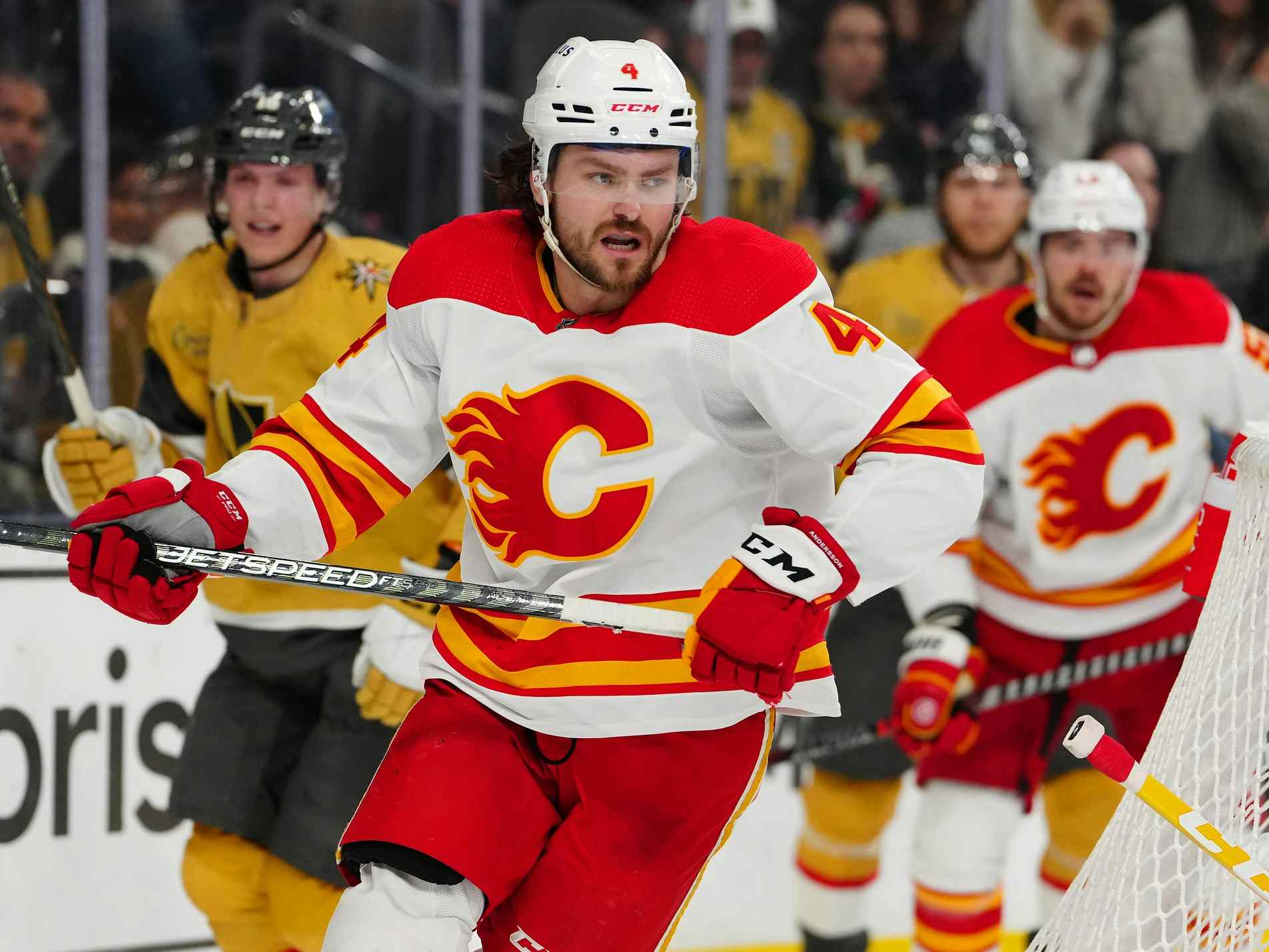What we learned in 2015: TJ Brodie is a number one defenceman
By Ari Yanover
8 years agoRemember the 2010-11 season? The Flames were coming off their first missed post-season since 2004, and were hungry to make it back into the playoffs. They had a veteran-laden team, and next to no prospects to actually speak of.
But then there was the Penticton Young Stars Tournament, and there was one prospect who started making people wonder who this kid was, and what he was gonna do. He wore #66, and he ended up making the Flames out of camp.
His name was T.J. Brodie, and after just three NHL games, he very quickly proved he was not yet ready. But he was one very lone, very bright ray of sunshine. Very, very, very bright, as it turned out.
This past year, we learned T.J. Brodie is a number one defenceman.
A slow ascension
T.J. Brodie was not A Name.
A Name is someone everyone looks forward to at the draft. All you have to do is be a casual hockey fan, and you’re well aware of who the guy is. Drew Doughty, for example, was A Name; he was selected second overall. Alex Pietrangelo, fourth overall, was also A Name.
Brodie, 114th overall in the same draft class, was not. It’s hardly unheard of for fourth round picks to make the NHL, but they aren’t expected to. They typically aren’t coveted. It can take a lot longer for fans to learn just who they are, but patience pays off.
We’re kind of at that point with Brodie today. Casual fans are increasingly aware of who he is, but he’s still second fiddle, was even third fiddle to some when Dougie Hamilton’s name entered the fray. Mark Giordano is the guy, though; Brodie is just another guy who happens to keep up with him. It’s Giordano who got the Norris buzz, the Team Canada – Olympic or World Cup – buzz, who gets the recognition as the Flames’ captain and a lethal scoring threat while still being solid defensively.
And that’s all completely deserved. Giordano worked his way up, undrafted, playing a year in Russia, and fighting for a spot in the lineup just as his partner did. He became A Name as a result.
But now it’s time for Brodie, seven years younger.
To the top (pairing)
Brodie established himself as an NHLer when he was recalled in the 2011-12 season; he played his final games in the AHL due to the 2012 lockout. He was a healthy scratch to start that season, but after that, he never looked back.
And with the Flames’ 2013 fire sale, there were few options to go alongside Giordano on the top pairing. Jay Bouwmeester had been capable of playing a ton of minutes well to the benefit of the Flames, but with him gone, and the season long lost, Brodie’s ice time shot up to well over 20 minutes a game.
With the 2013-14 season the first of the rebuild and expectations accordingly low, the 23-year-old Brodie reprised his spot on the top pairing; furthermore, suddenly, Giordano set a new career high in points. The two became one of the NHL’s best defensive pairings, though you needed to know the other stats to know it: they were playing in difficult circumstances and the Flames, one of the NHL’s worst teams that season, were significantly, significantly better with Giordano and Brodie on the ice. They had two of the highest CF% rels out of all regular NHLers that season, with Giordano at the top and only Patrice Bergeron ahead of Brodie.
Here’s the thing about that partnership, though: Giordano didn’t start reaching those lofty highs until it happened. Brodie was simply doing with Giordano what he’d been doing with every partner he’d had to date, only it looked even better because Giordano was better than anyone he’d ever played with before.
This past year
If it wasn’t clear Brodie was a number one defender yet, it became obvious as 2015 advanced further along. No, his numbers weren’t as awesome when he was forced to play alongside Deryk Engelland due to Giordano’s injury, but then it came out that not only had Brodie been playing with an inferior partner, but with a severely sprained ankle as well.
Any player could be forgiven for a dip in performance with that in mind, but knowing he was still playing huge minutes – he averaged 27:07 in the playoffs – despite the injury just showed how willing he was to take on the role; and how capable he was, too, considering he never really hurt the Flames even with those circumstances.
But Brodie’s status was really, really cemented when he was injured this past pre-season, and he missed the Flames’ first nine games this season. Or, perhaps to put it more accurately, just how much the Flames missed him.
This season
There’s little doubt Brodie breaking his hand in the pre-season contributed to the Flames’ disastrous start. Brodie missed the first nine games of the year, and without him, the Flames looked completely lost.
There was an initial assumption that the prize acquisition of the off-season, Dougie Hamilton, would be able to step in and hold down the fort for him, and perhaps even form a new top pairing with Giordano. It was a lot to ask of a young defenceman playing in the western conference for the first time, and it didn’t work out; really, it only served to highlight just how much Brodie’s loss negatively impacted the Flames.
What was really impressive, though, was how Brodie seamlessly stepped in when he came back. He didn’t even need any time to get his legs under him: while the rest of the NHL had already been playing a month, he instantly matched everyone else despite his late start.
He played 25:46 in his first game back, the second most on the Flames. The only indication he needed more time was the fact that he had zero shots on net, but in his second game back he had two – again while playing the second most minutes on the Flames – and that was that.
Since returning, Brodie averages 25:39 minutes a game, the most on the Flames. Only six defencemen in the NHL average more time than he does: Erik Karlsson, Ryan Suter, Drew Doughty, Alex Pietrangelo, Brent Burns, and Kris Letang. P.K. Subban, Duncan Keith, Jack Johnson, Oliver Ekman-Larsson, and Justin Faulk are the only other defenders in the league to average at least 25 minutes a game.
Being able to eat huge minutes is a big part of being a team’s number one defenceman, but that alone isn’t enough. Scoring is a vital part of the game as well, and if you’re elite enough to be considered among the best at the position, it has to be in all areas of the ice – including offensively.
| Player | TOI/GP | Points | Points/GP |
| Erik Karlsson | 28:22 | 41 | 1.08 |
| Ryan Suter | 28:05 | 24 | 0.69 |
| Drew Doughty | 28:01 | 23 | 0.64 |
| Alex Pietrangelo | 26:28 | 15 | 0.38 |
| Brent Burns | 26:23 | 33 | 0.92 |
| Kris Letang | 26:07 | 16 | 0.59 |
| T.J. Brodie | 25:39 | 19 | 0.70 |
| P.K. Subban | 25:30 | 26 | 0.67 |
| Duncan Keith | 25:28 | 21 | 0.75 |
| Jack Johnson | 25:20 | 8 | 0.22 |
| Oliver Ekman-Larsson | 25:15 | 25 | 0.69 |
| Justin Faulk | 25:02 | 30 | 0.81 |
Of the most-played defenders in the NHL, Brodie has the fifth best points per game. This is even more impressive considering he has only taken 32 shots on net all season. Keith has taken 45, Johnson 65, and everyone else on this list at least 80, so really, you have to wonder just how much better he could be if he actually shot the puck.
Brodie is currently third on the Flames in defencemen power play time per game with 2:25, but even that’s starting to change as he’s starting to get top unit duties. (Also, maybe if he shot more it’d go up – or maybe his shot rate will go up the more he plays on the man advantage.) He also averages 2:06 shorthanded, the most on the Flames.
So the summation on Brodie is: he plays some of the most minutes in the entire NHL, he plays in all situations, and he’s one of the most productive guys with all the considerable time he gets. He averages more than a full minute per game than Giordano, and scores more, too. That would pretty much set him firmly in place as a number one defenceman.
There’s one last area to look at: fancy stats. There, he does lag behind Giordano some. They’re still the top two defencemen, but Giordano’s CF% rel of 3.47 beats out Brodie’s 2.99 this season – but that’s with Brodie getting by far the worst zone starts, with a -4.86 ZSO% rel (Giordano’s is -1.67).
The Flames don’t have percentages as extreme as those exhibited by other NHL teams, so it’s not like Brodie takes by far the most defensive zone starts in the league (but he is very much up there in regards to quality of competition, as sorted by both the opposition’s ice time and corsi for). He isn’t a positive possession player on his own, but few playing in his circumstances are; furthermore, his 49.27% 5v5 CF isn’t terrible, and is instead highlighted as impressive considering he plays the toughest minutes on a 47.4% 5v5 CF team.
By every stat in the book, Brodie is a number one defender. He plays huge minutes in all situations. He scores. And he makes his team better every time he steps on the ice, all while taking on minutes many of his colleagues would not be able to handle.
The 2015 calendar year proved that; here’s to 2016 officially establishing T.J. Brodie as A Name.
Recent articles from Ari Yanover




